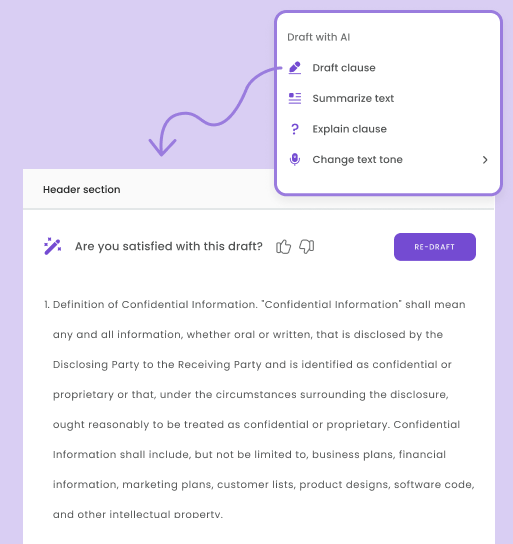In the olden days, you could discuss something verbally, seal it with a handshake, and get quality work done.
These aren’t the olden days.
Today, you’d be better served by having an agreement for any service provider you use. More specifically, a master services agreement.
In this guide, you’ll learn what a master services agreement is, the key components, the benefits it provides, and some of the challenges you may experience.
Definition and Purpose
A Master Services Agreement (MSA) is a comprehensive contract between two parties, typically a client and a service provider, that establishes the overarching terms and conditions governing the provision of services.
The MSA is designed to outline the general principles of the working relationship, such as payment terms, intellectual property rights, confidentiality, dispute resolution, and other fundamental aspects of the contractual relationship.
It’s a foundational document, under which specific service agreements, often referred to as statements of work (SOW), are created for individual projects or services.
Primary Purpose of an MSA
The primary purpose of an MSA is to streamline and simplify the contracting process for ongoing and future engagements between the parties.
By establishing a set of agreed-upon terms and conditions in advance, the MSA eliminates the need to negotiate these details for each new project, saving time and reducing administrative burdens.
This allows you to focus on the specifics of the project at hand, which are detailed in the SOWs.
An MSA provides clarity and consistency, ensuring that everyone has a mutual understanding of their obligations and expectations.
It helps mitigate risks by clearly defining roles, responsibilities, and procedures for handling various scenarios, such as changes in scope, termination of services, or resolution of disputes.
Additionally, the MSA fosters a stable and predictable business relationship, promoting efficiency and collaboration.
In essence, an MSA serves as a contractual framework that supports a long-term partnership between clients and service providers, enabling them to efficiently manage multiple projects or services under a unified set of terms.
This framework enhances operational effectiveness and reduces the likelihood of conflicts, ultimately contributing to a more productive and harmonious business relationship.
Key Components of a Master Services Agreement
A Master Services Agreement (MSA) is a comprehensive document that includes several critical components to ensure a clear and effective contractual relationship between those involved. Here are the key components typically included in an MSA:
Scope of Work
The scope of work (SOW) defines the specific services and deliverables that the service provider will offer the client.
While the MSA outlines the general terms, the SOW provides detailed descriptions of individual projects, tasks, or phases. It includes timelines, milestones, project objectives, and performance standards.
Each SOW is usually attached to the MSA as an exhibit and is subject to the overarching terms and conditions of the MSA.
Terms and Conditions
The terms and conditions section establishes the general rules and guidelines governing the relationship between the parties. This section includes:
- Duration and Renewal: The initial term of the agreement and conditions for renewal.
- Responsibilities: Duties and obligations of both the client and the service provider.
- Amendments: Procedures for modifying the agreement.
Payment Terms
Payment terms outline the financial aspects of the agreement, including:
- Pricing: Detailed pricing structure for services rendered.
- Invoicing: Procedures for invoicing, including frequency and required documentation.
- Payment Schedule: Payment due dates and any applicable penalties for late payments.
- Expenses: Clarification on how expenses are handled, whether they are included in the fees or billed separately.
Intellectual Property Rights
The intellectual property rights (IPR) section addresses the ownership and use of intellectual property created or utilized during the provision of services. This section typically includes:
- Ownership: Allocation of ownership rights for any IP developed during the engagement.
- Licensing: Rights granted to the client to use the service provider’s pre-existing IP.
- Protection: Measures to protect proprietary information and IP from unauthorized use or infringement.
Confidentiality Clauses
Confidentiality clauses ensure that any sensitive information shared between the parties remains protected. Key elements include:
- Definition of Confidential Information: Clear description of what constitutes confidential information.
- Obligations: Duties of both parties to protect and not disclose confidential information.
- Duration: The time period during which confidentiality obligations remain in effect, even after the termination of the agreement.
- Exclusions: Situations where confidential information may be disclosed, such as by law or with prior consent.
Dispute Resolution Mechanisms
Dispute resolution mechanisms outline the procedures for resolving any conflicts that may arise during the term of the MSA. This section may include:
- Negotiation: Initial steps to resolve disputes through direct negotiation between parties.
- Mediation and Arbitration: Use of third-party mediators or arbitrators to settle disputes without going to court.
- Jurisdiction: Specification of the legal jurisdiction and governing law that will apply to the agreement.
Termination Clauses
Termination Clauses specify the conditions under which the MSA can be terminated by either party. This section includes:
- Termination for Cause: Conditions under which the agreement can be terminated due to a breach or failure to perform.
- Termination for Convenience: Provisions allowing either party to terminate the agreement without cause, typically with prior notice.
- Effects of Termination: Rights and obligations of the parties upon termination, including the handling of incomplete work and payment for services rendered up to the termination date.
In summary, these key components collectively ensure that the MSA provides a clear, comprehensive framework for the relationship between the client and the service provider, addressing essential aspects of the engagement and helping to manage expectations, responsibilities, and potential risks effectively.
Benefits of Using a Master Services Agreement
Master Services Agreements (MSAs) offer several advantages for both clients and service providers, contributing to efficient and effective business operations.
Here are some key benefits of using an MSA:
Streamlining Operations and Transactions
MSAs streamline business operations by providing a standardized framework for contracting. Instead of negotiating terms for each new project or service engagement, you can refer to the pre-established terms and conditions outlined in the MSA.
This saves time and resources, allowing you to focus on the specific details of individual projects rather than negotiating fundamental contractual elements repeatedly.
Reducing Legal Risks and Ambiguities
By clearly defining the rights, obligations, and responsibilities of all parties, an MSA helps mitigate legal risks and uncertainties.
The detailed terms and conditions in the agreement minimize ambiguities and misunderstandings, reducing the likelihood of disputes or disagreements arising during the course of the engagement.
Additionally, incorporating provisions for dispute resolution and termination mechanisms provides a structured framework for addressing potential conflicts, further minimizing legal risks.
Establishing Clear Expectations and Responsibilities
By delineating the scope of work, pricing, payment terms, timelines, and other essential aspects of the engagement, the MSA ensures that everyone understand their roles and obligations.
This clarity helps prevent misunderstandings and ensures alignment between the client’s requirements and the service provider’s deliverables.
Enhancing Long-Term Business Relationships
MSAs facilitate the development of long-term business relationships by fostering trust, consistency, and predictability.
By establishing a standardized framework for multiple engagements over time, MSAs create a stable foundation for ongoing collaboration.
Familiarity with the terms and conditions outlined in the MSA cultivates a sense of reliability and professionalism, enhancing the overall business relationship and promoting continued partnership and collaboration.
Differences Between an MSA and Other Contracts
When comparing a Master Services Agreement (MSA) with other types of contracts commonly used in business relationships, such as Service Level Agreements (SLAs), Statements of Work (SOWs), and Purchase Orders (POs), several distinctions become apparent:
MSA vs. Service Level Agreements (SLAs)
Master Services Agreement (MSA):
- A comprehensive contract that outlines the general terms and conditions governing the overall relationship between the parties.
- Establishes the framework for future engagements and projects between the client and service provider.
- Typically does not include specific performance metrics or service-level targets but may reference SLAs attached as exhibits.
Service Level Agreement (SLA):
- A specific contract that defines the performance standards, quality measures, and service-level targets for a particular service or set of services.
- Focuses on measurable outcomes and the delivery of services according to agreed-upon criteria.
- Often included as an exhibit or referenced within an MSA to specify service-level expectations for individual projects or services.
MSA vs. Statements of Work (SOWs)
Master Services Agreement (MSA):
- Establishes the overarching terms and conditions applicable to the entire relationship between the parties.
- Provides a framework for future engagements but does not detail specific project requirements or deliverables.
Statement of Work (SOW):
- A detailed document that outlines the specific tasks, objectives, deliverables, timelines, and resources for a particular project or service.
- Developed under the umbrella of the MSA, with each SOW being attached as an exhibit and subject to the terms and conditions outlined in the MSA.
- Specifies the scope of work, project milestones, acceptance criteria, and other project-specific details.
MSA vs. Purchase Orders (POs)
Master Services Agreement (MSA):
- Defines the general terms and conditions governing the overall relationship between the parties, including pricing, payment terms, intellectual property rights, confidentiality, and dispute resolution mechanisms.
- Typically executed before any services are rendered and serves as the foundational agreement for future engagements.
Purchase Order (PO):
- A document issued by a buyer to a seller, formally requesting the purchase of goods or services.
- Specifies the quantity, description, price, and terms of the products or services being ordered.
- Used for individual transactions or orders within the scope of the overarching MSA, detailing specific purchase requirements and financial terms.
Position of an MSA in Contractual Hierarchy
An MSA holds a unique position in the contractual hierarchy, serving as the foundational agreement that governs the overall relationship between the parties.
While other contracts, such as SLAs, SOWs, and POs, focus on specific aspects of the relationship or individual transactions, the MSA provides a comprehensive framework for future engagements.
It sets out the general terms and conditions that apply to all projects or services undertaken between the parties, establishing consistency, clarity, and predictability in the business relationship.
Potential Pitfalls and How to Avoid Them
Master Services Agreements (MSAs) are powerful tools for establishing clear terms and conditions in business relationships, but they can also be susceptible to common pitfalls if not carefully crafted and managed. Here are some potential pitfalls and strategies for avoiding them:
Common Mistakes in Creating or Using MSAs
- Overly Complex or Ambiguous Terms:
- Complex language or ambiguous terms in an MSA can lead to misunderstandings and disputes between the parties.
- Unclear definitions of key terms or provisions may result in differing interpretations, causing confusion during the course of the engagement.
- Failure to Update the MSA as Needed:
- Business relationships evolve over time, and changes in circumstances may require updates to the MSA.
- Failure to revise the MSA to reflect changes in services, pricing, or other terms can result in outdated agreements that no longer accurately represent the parties’ intentions.
Strategies for Avoiding These Pitfalls
- Regular Reviews and Updates:
- Schedule regular reviews of the MSA to ensure it remains current and reflective of your needs and expectations.
- Consider implementing a formal review process with designated intervals for revisiting and updating the MSA as necessary, such as annually or biannually.
- Clear Communication Between Parties:
- Foster open communication throughout the engagement to address any concerns or changes that may arise.
- Encourage proactive dialogue about potential modifications to the MSA, such as new services, pricing adjustments, or changes in scope, to ensure that the agreement remains relevant and effective.
- Simplify and Clarify Terms:
- Use clear and straightforward language in drafting the MSA to ensure that terms and provisions are easily understood by both parties.
- Define key terms and concepts explicitly to minimize the risk of misinterpretation or ambiguity.
- Document Changes and Amendments:
- Document any changes or amendments to the MSA in writing and ensure that both parties review and agree to the modifications.
- Maintain a record of all revisions and updates to the MSA for future reference and compliance purposes.
- Seek Legal Guidance:
- Consult with legal counsel to ensure that the MSA complies with applicable laws and regulations and adequately protects the interests all parties.
- Legal professionals can provide valuable insights and guidance on best practices for drafting, negotiating, and implementing MSAs.
By implementing these strategies, you can avoid common pitfalls associated with MSAs and maintain effective and mutually beneficial business relationships.
Regular reviews and updates, clear communication, simplified terms, and legal guidance are essential for ensuring that the MSA accurately reflects the parties’ intentions and promotes a successful partnership.
Conclusion
An MSA is an important document that makes future collaborations between you and a service provider easier. It focuses on the overall terms and conditions as opposed to specific project deliverables.
It can save a lot of time and energy when working with long-term partners because it eliminates the need for lengthy negotiations.
Consider your current partners and service providers and determine whether or not an MSA will be useful for you or not.
Let me know what you think in the comments and don’t forget to share.




